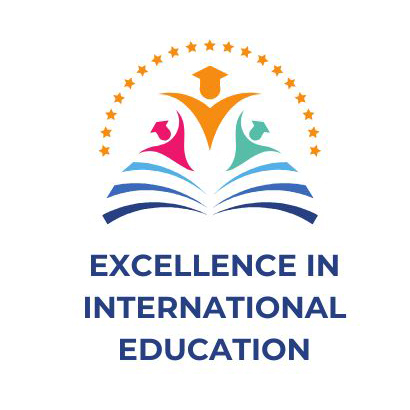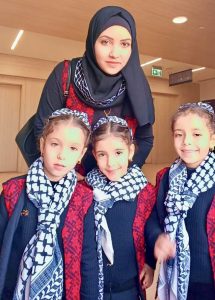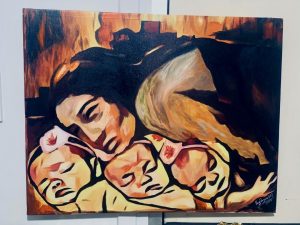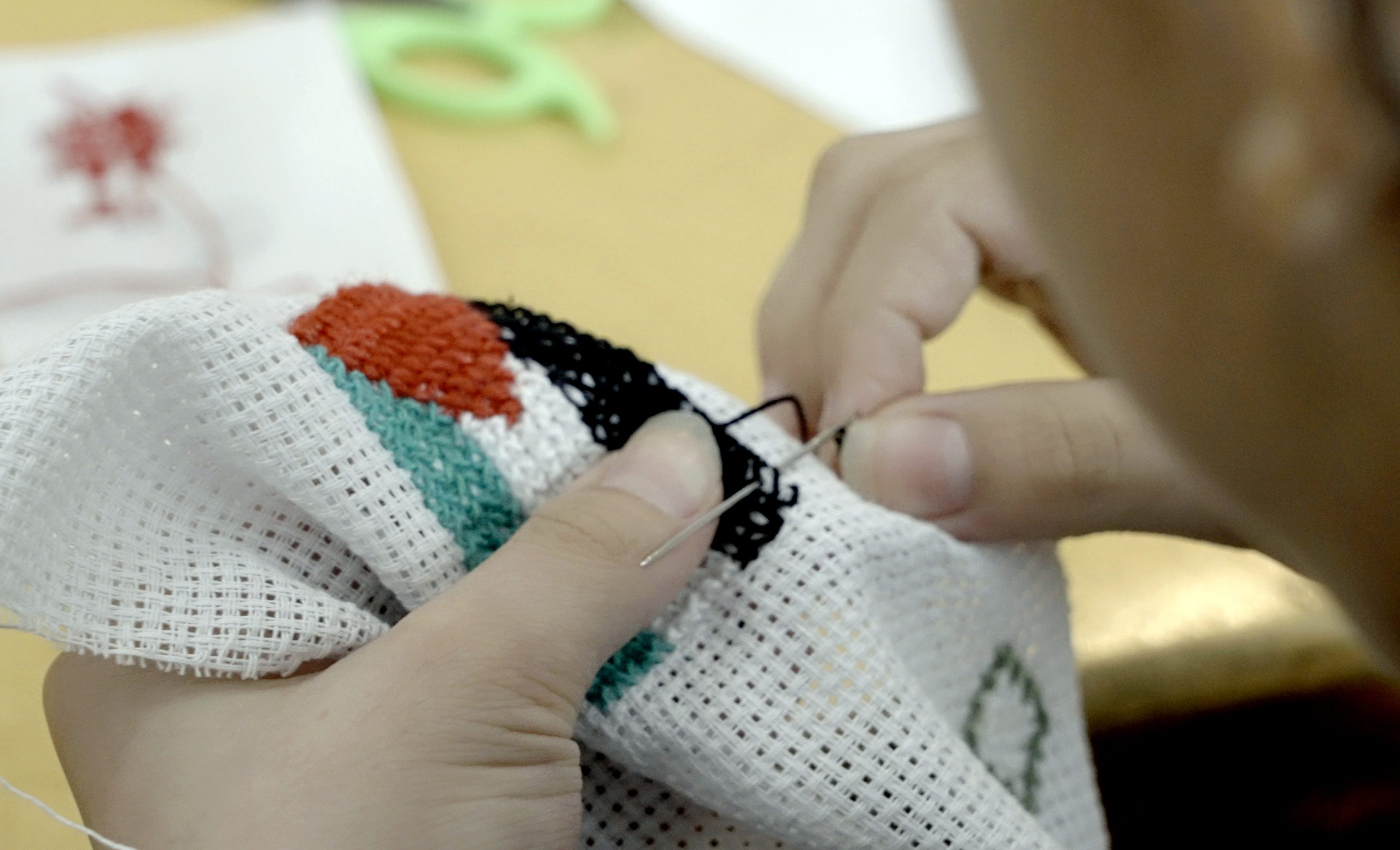
17 Apr Palestinian Art: Tatreez, Paintings, and Hope in Cairo, Egypt
Palestinian Women Weaving Culture and Hope in Cairo, Egypt
Cairo is a bustling metropolis; it is also a refuge for countless families displaced by war and hardship. Among them are Palestinian women who, far from their home, embody extraordinary resilience. Facing the daily realities of rebuilding their lives in Egypt, they draw upon their rich heritage and strength, transforming traditional arts like intricate Tatreez cross-stitch and vibrant paintings into lifelines. Palestinian art not only provides crucial economic support for their families but also serves as a powerful tool for maintaining cultural identity and fostering profound therapeutic healing.
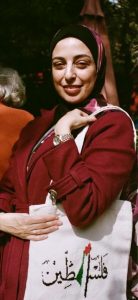
A Tapestry of Tradition
Imagine a canvas waiting to be brought to life by the patient dance of needle and thread. This is the essence of Tatreez, the intricate and deeply symbolic traditional Palestinian cross stitch embroidery. More than just a craft, it’s a vibrant language woven through generations, a testament to the artistry and history of Palestinian women.
Each stitch in Tatreez is a deliberate act, forming geometric patterns and motifs that speak volumes. Think of the eight-pointed star, the cypress tree reaching towards the sky, or the delicate rows of carnations – each carries a specific meaning, often connected to nature, ancestral heritage, or social status. The rich color palettes, dominated by deep reds, vibrant blues, and earthy tones, further enhance this visual narrative, with variations signifying the weaver’s region of origin.
Historically, Tatreez is an integral part of a Palestinian women’s identity. It adorns their thobes (traditional dress), reflecting her village, marital status, and even significant life events. Passed down from mother to daughter, the knowledge and skill of Tatreez is a vital link in the chain of cultural continuity, a tangible expression of Palestinian identity deeply rooted in the land and its traditions. Even in displacement, the threads of Tatreez remain strong, connecting these women to their homeland and providing a powerful symbol of their enduring heritage.
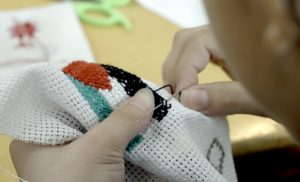
Finding Calm in Chaos
In the unsettling reality of displacement, the act of cross-stitch becomes a creative outlet for Palestinian women; it evolves into a profound form of therapy. The repetitive motion of the needle piercing the fabric, the rhythmic counting of threads, and the focused attention required to follow intricate patterns creates a meditative state. This immersion in the present moment offers an escape from anxieties and uncertainties of the future.
The nature of cross-stitch provides a sense of control in an environment where so much is beyond grasp. Each stitch is a victory, a tangible manifestation of order in a world of chaos. The predictable grid of the fabric and the step-by-step nature of the patterns structure a sense of accomplishment, this fosters feelings of calmness and stability.
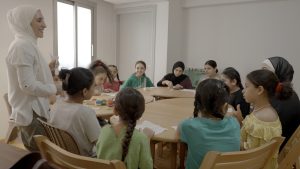
Weaving the Tapestry of Heritage
Tatreez, is more than a handicraft for Palestinian women; it is a vital link to their rich heritage. Each stitched motif is passed down through generations, carrying history, connecting women to their ancestral villages, traditions, and the very soul of Palestinian identity. In a world where displacement leads to fractures in cultural ties, Tatreez serves as a powerful anchor, keeping the stories, symbols, and the spirit of Palestine alive.
Teaching this intricate skill to women and children in their new communities is a profound act of cultural preservation. In the passing of the needle and thread, knowledge, stories, and a sense of belonging are transformed. Young girls learn the techniques of Tatreez, and the names and meanings of the patterns, the historical context and representation along with pride and cultural identity. This intergenerational transfer ensures that the legacy of Tatreez continues.
Maintaining a strong cultural connection is of paramount importance for displaced communities. It provides a sense of continuity, belonging, and psychological well-being in the face of loss and uncertainty. Cultural practices like Tatreez offer a vital source of identity, community cohesion, and emotional resilience. By keeping these traditions alive, these Palestinian women in Cairo are not just creating beautiful art; they are safeguarding their memory, strengthening their community bonds, and ensuring that their cultural heritage in a new and unfamiliar land. The threads they weave are threads of history, identity, and hope.
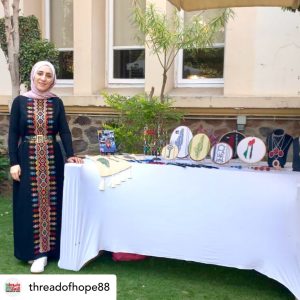
Weaving a Path to Independence
Meet Alaa Shaker, a Palestinian woman in Cairo who has transformed her deep knowledge of Tatreez into a thriving micro-business Thread of hope. Recognizing the therapeutic and cultural significance of this art form, Alaa began by offering classes at local community centers, sharing her skills with both women and children. This initiative not only preserves a vital cultural tradition but also creates a supportive network within the Palestinian community.
Building on her reputation for care, dedication to her craft, and the beautiful items created by her students, Alaa established Thread of Hope as a source of income and empowerment. She teaches women the intricate techniques of Tatreez, providing them with a valuable skill that can be used to create their own income-generating products. Alaa then showcases and sells these handcrafted items, alongside her own creations, at local artisan markets in Cairo.
Running a micro-business in Cairo presents both challenges and opportunities. While navigating unfamiliar markets and language barriers can be difficult, the demand for unique, handcrafted items, especially those with cultural significance, offers a pathway to economic independence. Alaa has skillfully leveraged the beauty and heritage of Tatreez to tap into this market.
The importance of supporting these businesses cannot be overstated. For Alaa and the women she teaches the income generated from selling their cross-stitch creations is crucial for supporting their families. It provides financial stability, allowing them to afford food, shelter, education for their children, and access to essential healthcare. This economic empowerment fosters a sense of dignity enabling them to become active contributors to their own well-being and the stability of their families.
The impact of Thread of Hope extends even further. Recognizing the value of Alaa’s work and the exquisite craftsmanship of the Palestinian women, many foreigners and non-profit organizations purchase her pieces in bulk. These bulk orders are often sold abroad, providing Alaa with crucial capital to expand her business and, importantly, generating funds for other non-profit organizations and programs dedicated to serving the Palestinian community. In this way, Alaa’s Thread of hope is not just a business; it is a powerful thread connecting cultural preservation, economic empowerment, and collective support for displaced Palestinians in Cairo and beyond.
To inquire about Alaa’s workshops or to purchase her beautiful products a direct message can be sent to her Instagram account: @threadof hope88
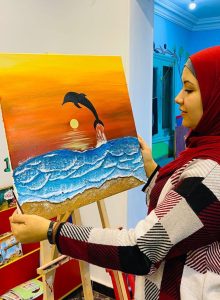
Brushstrokes Bring Healing
Meet Fayza Youssef, a remarkable artist and mother of triplet daughters – Mira, Miral, and Miriam from Beit Lahia, Palestine. Following a medical evacuation to Cairo after losing her husband, Dr. Hassan Al-Radee, a renowned Author of Economic Affairs, Fayza has found a new canvas for healing through art. Her artistic journey began early, winning her first competition at the tender age of three. Though life took its turns, she rediscovered her passion during her third year at Al-Azhar University, blossoming as a self-taught artist. Fayza’s creative spirit has clearly been inherited by her daughters displaying a natural talent for painting from just two and a half years old.
Today, Fayza dedicates her time painting alongside the children at a local center in Cairo, Egypt, nurturing their creativity while continuing to guide her own daughters in their artistic pursuits. Before the recent war, Fayza’s art was a vibrant reflection of happiness and life. However, her current healing journey is deeply interwoven into her art pieces, each telling poignant stories of the hardships and resilience she endured in Gaza before arriving in Cairo. Through her brushstrokes, she shares a powerful narrative of survival and the enduring human spirit.
Painting a Path Through Trauma
Painting for women like Fayza transcends mere artistic creation; it is a vital outlet for expressing the complex tapestry of emotions and experiences they have endured. Having witnessed the hardships of war in Gaza Fayza’s canvases have become a powerful medium for processing and externalizing the trauma she has faced. The act of choosing colors, applying brushstrokes, and watching images emerge allows her to give form to feelings that words often fail to capture.
In the fluid strokes and evolving imagery, Fayza finds a space for healing and self-discovery. The canvas becomes a safe ground where she can explore difficult memories and emotions, transforming them into a visual narrative. The process can be cathartic, allowing for the release of pent-up feelings and a gradual journey towards understanding and acceptance. Each painting is a step in her healing process, a tangible record of her resilience and her ongoing journey from pain towards a renewed sense of self. Through her art, Fayza not only shares her story but also demonstrates the profound therapeutic power of creative expression in navigating and transcending trauma.
Brushstrokes to Independence
Fayza, beyond her personal healing journey, has skillfully transformed her artistic talent into a burgeoning micro-business. Recognizing the demand for authentic and emotionally resonant art, she sells her paintings to local art enthusiasts and international buyers.
The challenges of establishing and sustaining a micro-business in a new and often uncertain environment are significant. However, Fayza’s dedication and the unique emotional depth of her work have led to notable successes. Her work has garnered attention from individuals and organizations seeking to support Palestinian artists, providing her with a crucial source of income.
The impact of Fayza’s art micro-business extends far beyond financial gain. The income generated from her paintings allows her to provide for her triplet daughters, ensuring their well-being and access to education. Moreover, her work serves as an inspiration to other women in the community, demonstrating the power of creative expression and entrepreneurial spirit in overcoming adversity.
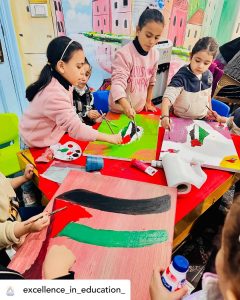
Fayza’s art classes for children at the local center in Cairo have a profound impact on the community. They offer a safe and creative outlet for children who have also experienced trauma, fostering healing and self-expression. By teaching them the skills to create art, Fayza is empowering a new generation to find their own voices and navigate their experiences through creative expression.
To Inquire about purchasing Fayza’s art or to sponsor her community art projects she can be reached directly through Instagram @fayza_yousef
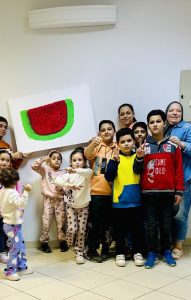
Excellence in International Education’s Creative Healing Programs
At Excellence in International Education (EIIE), we understand that families displaced by conflict carry the weight of trauma that words alone cannot express. Our art therapy workshops provide a vital outlet for these children, offering a safe space to process their experiences and begin the journey toward healing. At EIIE we believe that art is a powerful language, one that transcends barriers and allows children to communicate their emotions in a profound way. Through painting, drawing, story writing and other creative mediums, children are encouraged to explore their feelings, rebuild their self-esteem, and develop healthy coping mechanisms. Our trained art therapists guide them through this process, providing support and encouragement every step of the way.
EIIE’s art therapy workshops draw inspiration from resilient Palestinian women like Alaa and Fayza incorporating elements of cultural heritage into creative expression. We understand that for displaced women and children, maintaining a connection to their roots is essential for maintaining a sense of identity and belonging. Therefore, our sessions often include explorations of traditional Palestinian art forms, symbols, and stories.
By engaging in these creative activities, children not only express their emotions but also learn about their history and cultural legacy. Visual art offers a powerful way to make these lessons tangible and engaging, fostering a sense of pride and connection to their heritage.
In essence, our art therapy programs are not just about healing; they are about reclaiming identity, preserving cultural memory, and empowering children to build a brighter future. Through art, we are helping them to rewrite their narratives and find strength in their cultural roots.
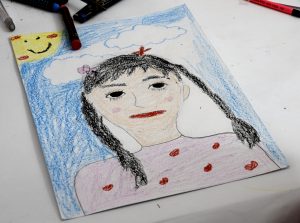
How You Can Help…….
These initiatives are not just programs; they are seeds of hope, cultivating a future where displaced families can rebuild their lives with dignity and purpose.
We invite you to join us in this vital work. Your support, whether through donations, volunteering, or simply spreading awareness, can make a profound difference in the lives of these resilient individuals. Together, we can empower them to build a brighter future.
To learn more about our work and how you can contribute, please visit: Home – Excellence in International Education or connect with us on Instagram
Volunteers provide invaluable support. Join us in making a real difference in the lives of women and children. Your time and talents can transform their futures.
In kind donations of Educational, Arts, Crafts, and Play Materials help us. Please sponsor materials here: Our Wish List
